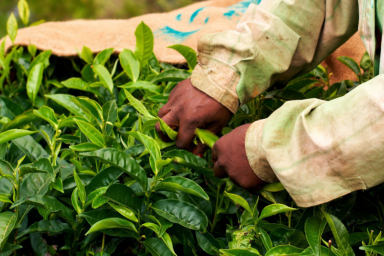How to become a sustainable hospitality business
With businesses of all types needing to play their part in tackling climate change, this guide outlines how smaller hospitality businesses can become more sustainable.
With over 220,000 businesses, the hospitality sector is the UK's third-largest employer.
The sector accounts for up to 15% of UK greenhouse gases, and it generates 920,000 tonnes of food waste each year.
In addition, annual energy costs for hospitality businesses are more than £1.3bn, which results in carbon emissions in excess of 8 million tonnes.
As well as increasing regulatory pressures, such as the new Plastic Packaging Tax, customers are demanding change too.
According to research by Paymentsense, 66% of UK consumers believe that ethical considerations matter when choosing where to eat, while Visit England (PDF, 686 KB) found 58% of people would want to stay in accommodation with green awards and environmentally friendly practices.
Sustainability areas to address
Below are some tips to start your journey to becoming a sustainable hospitality business.
The advice is not exhaustive, and it won't necessarily apply to all companies, but it provides ideas for some initial quick wins.
Energy efficiency and green infrastructure
The nature of hospitality businesses means that many appliances are in almost constant use.
Restaurants, for example, use up to ten times more energy than the average commercial business.
You could upgrade equipment to more energy-efficient solutions and review how they are used.
Air conditioning thermostats should be set appropriately, while dishwashers could be used only when full and turned off when not being used.
Maintaining and managing heating equipment at appropriate temperatures can also reduce energy consumption and costs.
The Carbon Trust recommends temperatures for specific areas in hospitality businesses.
Contact your energy supplier and ask about switching to a green or renewable business tariff.
If you have the budget and space, you could also generate your own renewable energy by installing technology such as solar panels.
The Carbon Trust has a guide to renewable energy.
Food waste
Hospitality and food service businesses waste 920,000 tonnes of food a year, 75% of which could be avoided.
This wastage costs the average venue £20,000 a year, which shows that reducing food waste isn't just good for the environment; it's good for your bottom line too.
From 2023, all hospitality businesses in England will be legally required to separate food waste from general waste and have it collected separately.
Steps you can take to tackle food waste include:
- monitoring customer leftovers and adjust portion sizes accordingly. Smaller portions can also help to increase sales as customers are encouraged to order another course
- removing unpopular dishes from the menu
- having a 'specials' menu to use up leftover ingredients
- measuring all ingredients to reduce waste and to keep portion sizes consistent
- installing grease traps to recover and recycle cooking oil and using environmentally friendly systems to tackle blockages
- storing food in the most appropriate environment and at the right temperature to increase its usable life
- ordering the ingredients you need when you need them rather than pre-ordering large amounts in bulk
- using glass containers to store items usually contained in packaged portions like cereal, jam and yoghurt to cut down on waste
- ensuring staff are trained in food waste management.
Source locally and seasonally
Sourcing seasonal food products from local suppliers can slash your carbon footprint, reduce transport costs and improve the quality of ingredients.
It can also cut down on food waste because the longer it spends in transit, the higher the chance of it being spoiled and wasted.
Local and seasonal produce can generate more sales too.
According to a 2021 survey by the Sustainable Restaurant Association, 80% of consumers would consider, be likely or be very likely to order a meal made with local and seasonal twists on a traditional recipe, while Paymentsense's Restaurant Insights 2020 study found 36% rate availability of local produce as a critical consideration when choosing a restaurant.
Rooms
Hospitality businesses have many spaces, such as hotel rooms and event venues, that can be made more sustainable.
Actions to take include:
- using smart technology in guest rooms, event spaces, corridors, and elsewhere to switch off lights or air conditioning when the rooms are empty. The Carbon Trust says sensors can achieve savings of 30% to 50% on lighting costs. Smart showers, which limit showering time, can also help to reduce water use
- installing aerators on bathroom sinks to reduce water usage
- eliminating single-use plastics for items such as soap, shower gel, coffee sachets and water bottles. Replace them with biodegradable or recyclable packaging or use refillable containers. If you provide coffee pods, replace them with compostable alternatives, and give guests reusable mugs rather than plastic or styrofoam versions
- making it easy for hotel guests to opt-out of daily room cleaning. This could be incentivised with vouchers and discounts for hotel services. Research shows that hotels requesting that guests reuse their towels reduces the number of laundry loads, plus the resulting energy and labour costs, by 17%
- washing laundry at lower temperatures can still clean to the standard required and significantly lower costs, water use, and energy consumption.
Further resources on sustainable hospitality
For more information on becoming a sustainable hospitality business, access the following:
Tags related to content:
Disclaimer: We make reasonable efforts to keep the content of this article up to date, but we do not guarantee or warrant (implied or otherwise) that it is current, accurate or complete. This article is intended for general information purposes only and does not constitute advice of any kind, including legal, financial, tax or other professional advice. You should always seek professional or specialist advice or support before doing anything on the basis of the content of this article.
Neither British Business Bank plc nor any of its subsidiaries are liable for any loss or damage (foreseeable or not) that may come from relying on this article, whether as result of our negligence, breach of contract or otherwise. “Loss” includes (but is not limited to) any direct, indirect or consequential loss, loss of income, revenue, benefits, profits, opportunity, anticipated savings, data. We do not exclude liability for any liability which cannot be excluded or limited under English law.
Green Decoder
Featuring a glossary of sustainable terms curated in partnership with the Nottingham Business School, Nottingham Trent University, our green decoder is helping smaller businesses decipher the terminology surrounding decarbonisation.



